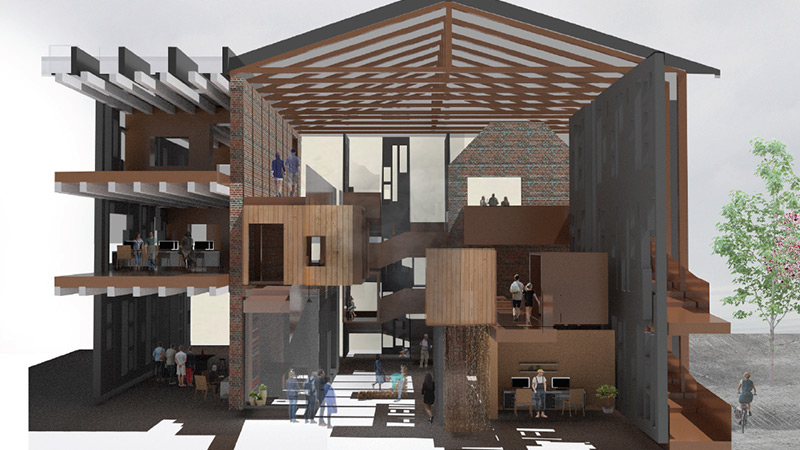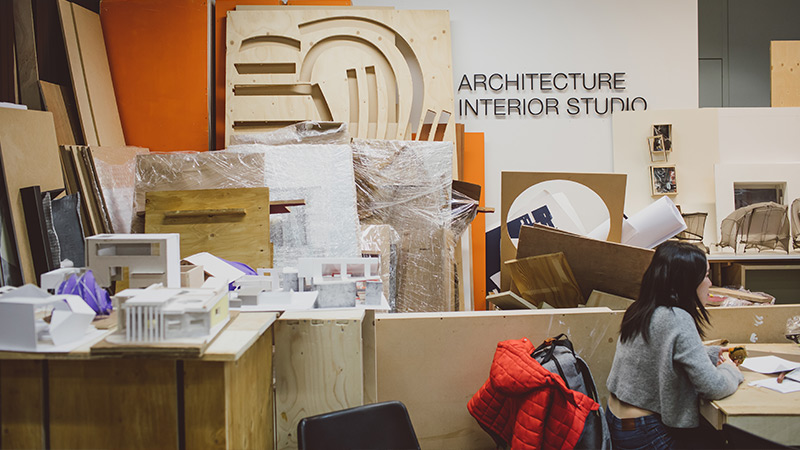Interior Architecture
MA
Key facts
School(s)
Overview
Interior Architecture merges competences between architecture, interior design, and social science. Its fluid approach permits for a shift of focus from the design of ‘objects’ (buildings and furniture) to an evaluation of the 'subjective' experience of the users. As the ‘spatial art of environmental design’, Interior Architecture refers thus to the process by which the interiors of buildings and public spaces are designed to support human activities, in a range of crafted environments that maintain a sustainable relation with the communities they serve.
Although the ability to design is not necessarily required for admission in this programme, each successful applicant must demonstrate an awareness of design consequences as evaluated in ‘real’ environments through a portfolio of social research work.

How to apply
Entry requirements
Specific entry requirements
Admission to the programme will normally be open to applicants who fulfil either of the following requirements:
-
hold a minimum of a second-class honours degree (2:2), or an equivalent overseas qualification from a recognised institution, in either a design-related discipline (e.g. interior design, interior architecture, architecture or product design) or in an environmental-oriented discipline (e.g. applied sociology, environmental psychology or human geography).
-
Submit a portfolio of research and design work, which will be requested after a valid application has been submitted.
Selected candidates will be invited for an interview, either in person or via a digital platform.
Please also see the University's general entry requirements.
English language requirements
If your first language is not English, you will require a minimum academic IELTS score of 6.5 overall with 6.0 in all components.
OR
An equivalent English language qualification acceptable to the University.
Please also see the University's standard English language requirements.
English requirements for visas
If you need a student visa to enter the UK you will need to meet the UK Visas and Immigration minimum language requirements as well as the University's requirements. Find out more about English language requirements.
Pathways courses for international and EU students
We offer a range of courses to help you meet the entry requirements for your postgraduate course and also familiarise you with university life in the UK.
Take a Pre-Master's course to develop your subject knowledge, study skills and academic language level in preparation for your master's course.
If you need to improve your English language, we offer pre-sessional English language courses to help you meet the English language requirements of your chosen master’s course.
Terms and conditions of enrolment
When you accept our offer, you agree to the Terms and Conditions of Enrolment. You should therefore read those conditions before accepting the offer.
Application process
Applications must meet the entry requirements, and demonstrate a profound awareness of the social consequences of design decisions in the built environment through the submission of a portfolio of relevant design and/or research work.
Suitable applicants will be invited to a comprehensive interview, either in person or via a digital platform.
Tuition fees
Questions about fees?
Contact Student Finance on:
Tuition fees
The following factors will be taken into account by the University when it is setting the annual fees: inflationary measures such as the retail price indices, projected increases in University costs, changes in the level of funding received from Government sources, admissions statistics and access considerations including the availability of student support.
How and when to pay
Tuition fee instalments for the semester are due by the Monday of week 1 of each semester. Students are not liable for full fees for that semester if they leave before week 4. If the leaving date is after week 4, full fees for the semester are payable.
- For information on payment methods please see our Make a Payment page.
- For information about refunds please visit our Refund policy page
Additional costs
Please be aware that some courses will involve some additional costs that are not covered by your fees. Specific additional costs for this course are detailed below.
Optional costs
| Additional costs | Amount (£) |
|---|---|
It’s your responsibility to cover print / binding costs where coursework submission is required. Please note that a lot of the coursework is now submitted online. |
From £30 |
| You may choose to purchase books to support your studies. Many books on our reading lists are available via the Library, or can be purchased secondhand. | £20-60 per book |
Accommodation fees in Brookes Letting (most do not include bills) |
£107-301 per week |
Accommodation fees in university halls (bills included, excluding laundry costs) |
£139-248 per week |
Graduation costs include tickets, gowning and photography. Gowns are not compulsory but typically students do hire robes, starting at £41. |
Typically £0-200 |
Students are responsible for their own travel to and from university for classes. For the 2025/26 academic year, the University is introducing an alternative subsidised travel offer for all students with further information on our Travel webpages. |
From £10 |
Funding your studies
Financial support and scholarships
Featured funding opportunities available for this course.
All financial support and scholarships
Learning and assessment
The student cohort includes graduates and practitioners from a variety of design related courses (interior design, interior architecture, product design, and architecture) as well as from environmental disciplines (sociology, environmental psychology and human geography). The purpose of this integrative approach is a practical one: we seek to equip students to intervene effectively in the production of an improved public realm, through a practice that is relevant to the design and the process of actual inhabitation in the built environment.
The concept of the reflective practitioner is therefore central to the MA Interior Architecture philosophy, with a unique blend of taught competences and critical expertise provided to enable students upon graduation to gain significant leverage in practice.

Study modules
Please note: As our courses are reviewed regularly as part of our quality assurance framework, the modules you can choose from may vary from those shown here. The structure of the course may also mean some modules are not available to you.
Learning and teaching
The course's teaching and learning methods are concerned with the practice of interior architecture as mediating between the disciplines of interior design and architecture, in relation to the social activities that occur in public and shared environments. This requires a combination of theoretical knowledge, professional competence, and direct experience acquired through research and design modules, project work, and analysis of specific sites.
Learning and teaching occur within the dedicated Interior Architecture studio, where lectures, seminars, analysis and evaluation, students-led discussions, and formal presentations provide for a stimulating learning and teaching environment. Wherever possible, we will assign ‘live projects’, where the learning experience is enriched through debate with the stakeholders and end-users.
Assessment
Assessment methods used on this course
A holistic approach to design specifications articulates the professional curriculum in the MA Interior Architecture, with an emphasis on critical methodologies of social evaluation and performance. To ensure that students from different academic and professional backgrounds are equally able to perform in the course, upon agreement with staff students can tailor submissions to suit their personal abilities and graphic style.
Students’ submissions include site surveys and analysis, written and photographic essays, seminar papers, project work and presentations, and workshops and design simulations. The assessment methods aim to test not only knowledge but also skills in research, analysis, and design awareness, in relation to five core attributes: Academic and Research Literacy, Professional Competence, Critical Self-Awareness, and Active Citizenship.
Research
The MA Interior Architecture broadens and consolidates the research on social design in the School of Architecture at Oxford Brookes, alongside the BA Honours Degree in Interior Architecture and the research group on Therapeutic Environments and Experiential Design.
Our team consists of architects, interior designers, historians and critics, with experience in dealing with social inclusivity, for example, live projects and client-led built propositions for education, flexible living, community infrastructure, and hospitality. In professional application, we have several design consultancies established with design practices and social services providers with the purpose of advising on the impact of design on people. This includes the (re)design of buildings from inside out as well as outside in, and the rehabilitation of existing structures to accommodate changed purposes, as well as contributions to new design propositions as part of a more sustainable architecture practice.
After you graduate
Career prospects
Design practices are increasingly required to produce socially inclusive design solutions, by aligning spatial qualities to individual multi-sensorial experience. Graduates from the MA Interior Architecture will be proficient in the shift from sustainability quantitative indicators to qualitative experiential parameters, with the ability to provide comprehensive people-focused design competencies and tailored solutions to fulfil the changing demands from users.
Related courses
Programme changes:
On rare occasions we may need to make changes to our course programmes after they have been
published on the website. For more information, please visit our
changes to programmes page.
